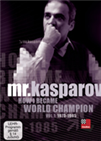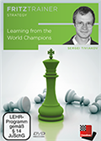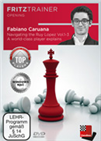A prodigious player
 Born in Horlivka on 11 October 1983, Ruslan Ponomariov became the youngest grandmaster in the world in 1998. The record was subsequently broken by Bu Xiangzhi and Sergey Karjakin, but that does not take away from the fact that the Ukrainian was a prodigious player.
Born in Horlivka on 11 October 1983, Ruslan Ponomariov became the youngest grandmaster in the world in 1998. The record was subsequently broken by Bu Xiangzhi and Sergey Karjakin, but that does not take away from the fact that the Ukrainian was a prodigious player.
With a peak rating of 2764, achieved in July 2011, Ponomariov can pride himself on a long list of professional achievements, including individual triumphs in Dortmund, Pamplona and San Sebastián, as well as gold medals with the Ukrainian team at the 2004 and 2010 Chess Olympiads, played in Calvia and Khanty-Mansiysk respectively.
Notwithstanding, perhaps Ponomariov is best known for his excellent results in knockout events, including his first place at the 2002 FIDE World Chess Championship, when he defeated compatriot Vasyl Ivanchuk in the final to become the youngest ever FIDE World Champion at 18.
Remarkably, he also reached the finals at the 2005 and 2009 World Cups, and made it into the semifinals in 2011. His ability to get consistent good results in such tough single-elimination tournaments might have something to do with his approach to the game, which he regards as a sport more than as science or art. In an interview for Crestbook, he wrote:
For me chess is, first and foremost, a sport. I know people who use chess for scientific research. It’s quite hard for me to imagine chess in a pure form, as an art.

Competitors at heart — Sergey Karjakin, Ruslan Ponomariov and Veselin Topalov
 Garry Kasparov's rise to the top was meteoric and at his very first attempt he managed to become World Champion, the youngest of all time. In over six hours of video, he gives a first hand account of crucial events from recent chess history, you can improve your chess understanding and enjoy explanations and comments from a unique and outstanding personality on and off the chess board.
Garry Kasparov's rise to the top was meteoric and at his very first attempt he managed to become World Champion, the youngest of all time. In over six hours of video, he gives a first hand account of crucial events from recent chess history, you can improve your chess understanding and enjoy explanations and comments from a unique and outstanding personality on and off the chess board.Much has been said about the World Championship title being attached to the knockout tournaments organized in that era. Ponomariov has repeatedly explained that he simply played by the rules and won the tournament fair and square. In fact, Magnus Carlsen himself once proposed — while already a champion himself — for the World Championship to be played as a knockout tournament, reducing the privilege given to the previous holder of the crown.
Another usual criticism focuses on the element of luck in such events, although by now it seems clear that there are players who know how to reduce this factor importantly — Peter Svidler, Sergey Karjakin and Levon Aronian have had repeated successes under this format, like Ponomariov.
It is apparent, nonetheless, that the chess community has agreed to return to a cycle more similar to the one applied during most of the 20th century, which we can certainly not argue against. This, however, does not diminish the accomplishments achieved by Ponomariov at the start of the century. Responding to a question which dealt with the issue of luck in chess in the same interview for Crestbook, the Ukrainian explained:
Do you think there’s nevertheless an element of luck in chess? If yes, then what is it?
I’m not really sure what you have in mind when you use the term “luck”. It strikes me that everything in life happens for a reason, and chess is no exception. It’s another matter that it’s not always possible to explain logically. Why, for example, does a chess player blunder a piece in a won position? Or why does the fair-haired man always beat the dark-haired man? [Translator’s note: A reference to the famous chess-lecture by Ilf and Petrov’s con-man hero, Ostap Bender, in the comic novel, “12 Chairs”]. An element of uncertainty and unpredictability does exist in chess. And that’s very interesting!
 Throughout the years, Ponomariov has shown that he is not afraid to find his own way and let everyone know what is on his mind, which, as it usually happens, has gained him both admirers and detractors. This feature of the Ukrainian’s personality really comes through in the following exchange from a 2008 interview with GM Dmitry Komarov for the magazine Sobytiya:
Throughout the years, Ponomariov has shown that he is not afraid to find his own way and let everyone know what is on his mind, which, as it usually happens, has gained him both admirers and detractors. This feature of the Ukrainian’s personality really comes through in the following exchange from a 2008 interview with GM Dmitry Komarov for the magazine Sobytiya:
Q: And how would you prefer to spend your hard-earned cash?
A: I have a dream – to travel around the Mongolian steppes on horseback. One of my friends at the institute of physical culture travelled in the Antarctic and brought me back a souvenir coin. Listening to his stories of the ice and penguins, I also yearned to see the Antarctic. I have already found out that this pleasure would cost me about 10,000 Euros.
Q: You would not be frightened of freezing to death out there?
A: Cold is nothing to be frightened of. Last December, I got some frostbite on my ear. The doctor said I would have to rest for a month and take antibiotics. But just then I went to a Christening and some friends persuaded me to go down an ice-hole with them.
Q: No! What happened?
A: Up to then, I had never tried swimming in winter. Of course, I was a bit nervous. But when the priest blessed this ice-hole, in the shape of a cross, I got into the water with the others. It was great, and the next day, my ear had recovered completely. A month later, I was in Spain. Of course, there it is much warmer than in Kiev, but even so, it was quite cold, but I did not deprive myself of the pleasure of bathing in the Atlantic Ocean.
 With famous classical examples from the works of the giants, the author talks in detail about principles of chess and methods of play that we can use during every stage of the game.
With famous classical examples from the works of the giants, the author talks in detail about principles of chess and methods of play that we can use during every stage of the game.But has he managed to finally make his way to Mongolia? Ben Johnson had Ponomariov as a guest on his excellent Perpetual Chess Podcast last month and asked him this very question. The 37-year-old, who is now a father of two, confessed that he has yet to accomplish this dream.
“But who knows?”, he added, candidly.

Ruslan Ponomariov and Ben Johnson
FIDE World Championship 2002
The FIDE World Chess Championship 2002 was held in Moscow. The first six rounds were played between 27 November and 14 December 2001, and the final match started on 16 January and ended on 23 January 2002.
Similar to the World Cup, the first five rounds consisted of two-game matches, followed by tiebreaks at faster time controls if required. Unlike the recent editions of the World Cup, though, the semifinals were played to the best of four games, while the final was an eight-game match which, as mentioned above, was played a month after the finalists were decided.
 The Ruy Lopez is one of the oldest openings which continues to enjoy high popularity from club level to the absolute world top. In this video series, American super GM Fabiano Caruana, talking to IM Oliver Reeh, presents a complete repertoire for White.
The Ruy Lopez is one of the oldest openings which continues to enjoy high popularity from club level to the absolute world top. In this video series, American super GM Fabiano Caruana, talking to IM Oliver Reeh, presents a complete repertoire for White.Ponomariov won 2 out of the 5 first rounds without needing tiebreaks, knocking out Li Wenliang, Sergei Tiviakov, Kiril Georgiev, Alexander Morozevich and Evgeny Bareev to set up a semifinal against Peter Svidler.
The Ukrainian defeated the then 26-year-old Svidler 2½-1½ in the classical phase of their match, before beating Ivanchuk 4½-2½ in the final. Ponomariov scored wins in games 1 and 5 and drew the rest to secure the title with one game to spare.

Ponomariov 4½ - 2½ Ivanchuk - Games
Links


















 Born in Horlivka on 11 October 1983, Ruslan Ponomariov became the youngest grandmaster in the world in 1998. The record was subsequently broken by Bu Xiangzhi and Sergey Karjakin, but that does not take away from the fact that the Ukrainian was a prodigious player.
Born in Horlivka on 11 October 1983, Ruslan Ponomariov became the youngest grandmaster in the world in 1998. The record was subsequently broken by Bu Xiangzhi and Sergey Karjakin, but that does not take away from the fact that the Ukrainian was a prodigious player.




